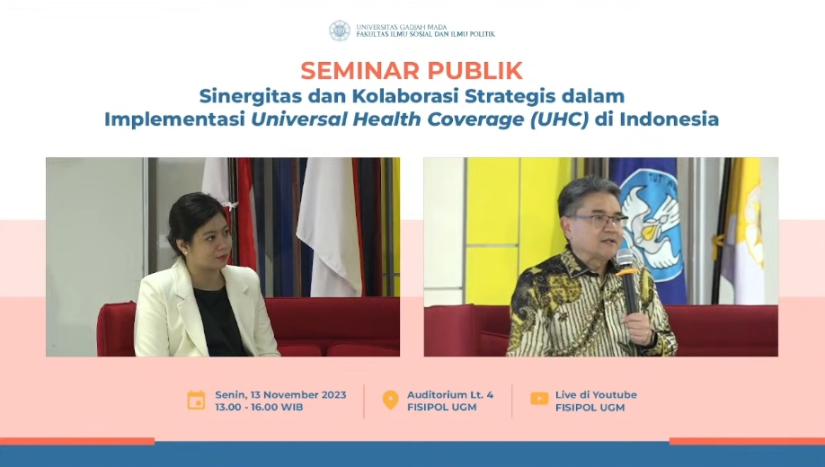
Yogyakarta, November 13th 2023—It is not uncommon for health insurance provided by the state to generate polemics, for example regarding participant contribution obligations. Issues such as arrears in contributions and questionable government commitment are the reasons why universal health coverage (UHC) has not been achieved. In the Research Days 2023 series, Fisipol UGM held a public seminar entitled “Synergy and Strategic Collaboration in the Implementation of Universal Health Coverage (UHC) in Indonesia”.
Dean of Fisipol UGM, Wawan Mas’udi, Ph.D., said that accessibility is an important part of national health insurance governance. “In the current era where everything is hoped to be digitized, the most important thing is the availability of digital infrastructure in all places,” said Wawan, starting the seminar. UHC governance cannot be separated from the inequality of digital infrastructure in Indonesia. However, Wawan also underlined the potential of regional resources to support the achievement of UHC. This was agreed by the Mayor of Medan, Muhammad Bobby Afif Nasution, S.E., M.M. He shared Medan’s experience as one of the best cities (best practice) for UHC. Bobby explained that collaboration and utilization of regional resources were the formula for this success. In particular, Medan City has a budget to cover gaps in social security provided by the central government. “The actual fiscal strength of a region certainly influences it, but the collaboration movement always influences it,” explained Bobby.
This formula was approved by the Deputy for Coordination of Social Welfare Improvement, Coordinating Ministry for Human Development and Culture, Prof. Dr. Ir. R. Nunung Nuryanto, M.Sc. According to him, revenue sharing and taxes received by regional governments can be allocated to support the achievement of UHC. The regional government’s commitment is of course full of political elements. The political dynamics of a region will greatly influence the government’s commitment to allocating its resources. On the same occasion, the Director of Planning and Development of BPJS Health, Dr. dr. Mahlil Ruby, M.Kes., also believes that political commitment is the main condition for the success of UHC in Indonesia.
Closing this seminar, Lecturer at the Department of Management and Public Policy, Dr. Ambar Widaningrum emphasized that social security must be seen as a country’s capital. “Once again, what is called education [and] health is actually long-lasting capital,” explained Ambar.
